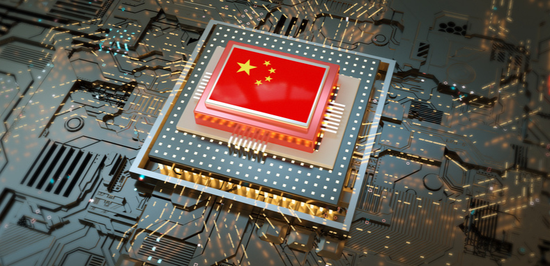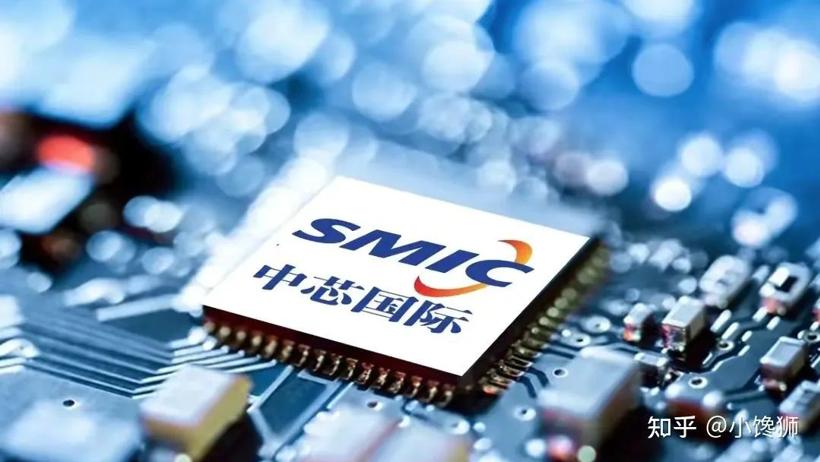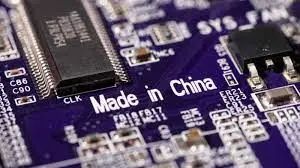If you don't push yourself, you don't know how good you are.
Under persistent U.S. sanctions and obstruction, China's chip industry has grown faster than anywhere else in the world, with 19 of the world's 20 fastest-growing chip industry companies over the past four quarters coming from the world's second-largest Economy - China.
That compares with just eight at the same time last year, according to data compiled by Bloomberg. These Chinese suppliers of design software, processors and equipment crucial to chip manufacturing are expanding their revenues several times faster than global leaders TSMC or ASML.

A global shortage of chips has disrupted supplies of everything from cars to smartphones. Biden last year ordered a review of the loopholes, finding that while the U.S. retains a sizable share of the chip design and manufacturing equipment market, related industries are "highly dependent" on overseas sales, particularly China.
This dilemma is evident in the latest data: In 2021, a surge in global chip demand will push orders received by US and Japanese companies to soar by 44%, with orders from China rising far faster than other regions. Once the production capacity of China's semiconductor industry begins to increase, the considerable share of the United States in the chip industry will disappear, so various sanctions against Chinese chip companies will come one after another.
The leader who was forced out
China's semiconductor industry is still showing signs of booming after China's leading domestic companies from Huawei to Hikvision were sanctioned by the United States, which is a wake-up call in Washington. According to data from the International Semiconductor Industry Association, orders for chip manufacturing equipment received by overseas suppliers from China will surge by 58% in 2021, making China the second largest market for the second year in a row.

This high growth underscores how tensions between Washington and Beijing are transforming the $550 billion global semiconductor industry, which plays a huge role in everything from defense to future technologies such as artificial intelligence and self-driving cars It is inseparable from the escort of the semiconductor industry.
In 2020, the U.S. began restricting the sale of U.S. technology to companies such as SMIC and Hangzhou Hikvision Digital Technology Co Ltd, successfully curbing their growth but unexpectedly also fueling a boom in Chinese chip manufacturing and supply .
While shares of companies such as Cambrian Technology have more than doubled from their lows this year, analysts say there is still room for growth. Beijing is expected to arrange billions of dollars in investment in the field under ambitious plans such as its "little giant" blueprint to support and fund national tech champions and encourage a "buy China" strategy to circumvent U.S. sanctions.

And the rise of local Chinese brands is attracting the attention of some of the most discerning customers: Apple is said to have chosen YMTC as its flash memory supplier for the iPhone 14.
Growing up in adversity
Another important reason for the rapid development of China's chip industry is that during the lockdown of the new coronavirus, Chinese customers who rely on semiconductor production have had to purchase local substitutes to ensure smooth production and delivery. "The biggest underlying trend is China's quest for supply chain self-sufficiency, driven by coronavirus lockdowns," said Morningstar analyst Phelix Lee.
China imports more than $430 billion worth of chipsets in 2021 free of geopolitical rivals. Orders for chip-making equipment from overseas suppliers rose 58% last year as local factories expanded capacity, which in turn boosted local business, according to data provided by the data.

Total chip manufacturing sales in China, including manufacturing and design, jumped 18 percent in 2021 to a record high of more than 1 trillion yuan ($150 billion), according to the China Semiconductor Industry Association.
Persistent chip shortages are cutting output at the world's largest auto and consumer electronics maker, which is also good for local chipmakers, helping Chinese suppliers more easily access international markets -- sometimes offering premiums for best-selling products, such as , automotive chips and PC chips.
Despite the Covid-19 pandemic that has paralyzed factories and logistics across China since 2020, SMIC and Hua Hong Semiconductor Co., the largest contract chipmakers, have kept their Shanghai factories operating at nearly full capacity. With the help of Shanghai authorities, cargo flights from Japan have delivered necessary materials and equipment to chip factories even as Shanghai is under lockdown. SMIC recently reported a 67% increase in quarterly sales, outpacing larger rivals GlobalFoundries and TSMC.
Revenue from Fullhan Microelectronics Co., also from Shanghai, grew by an average of 37% due to high demand for surveillance products. The video chip designer has pledged to expand into electric vehicles and artificial intelligence after winning the "little giant" title. Over the past four quarters, design-tools developer General Electronics has doubled its sales on average, saying it develops software that can be used to make 3-nanometer chips.

Putting aside concerns about long-term profitability, Morningstar Phelix Lee said the aggressive capacity building of Chinese companies will boost their global influence.
"There is no doubt that Chinese chipmakers can achieve revenue growth in the next few years through automobiles, consumer electronics and other devices," Phelix Lee said.
China is the world's largest consumer of semiconductors, but relies on foreign companies to supply chip-making equipment. At a time when the global chip shortage is serious, China's increasing production strength may mean that the world will become more dependent on Chinese supply. Grasping the chip is equivalent to grasping the fate of many industries. The importance is self-evident, but the United States' deliberate attempt to curb the development of China's chip industry is counterproductive. This may be: you don't know how good you are unless you push yourself.
On September 5th, we invite you to join us at the Wenzhou Auto Parts Exhibition on a journey to trace the origin of the Auto Parts City, as per the invitation from the purchaser!
Hot Booking | AAPEX 2024- Professional Exhibition Channel for Entering the North American Auto Parts Market
The wind is just right, Qianchuan Hui! Looking forward to working with you at the 2024 Wenzhou Auto Parts Exhibition and composing a new chapter!
Live up to Shaohua | Wenzhou Auto Parts Exhibition, these wonderful moments are worth remembering!
Bridgestone exits Russia and sells assets to S8 Capital
Live Up to Expectations and Honor to End | 2023 Wenzhou International Auto Parts Exhibition Successfully Ends! Looking forward to meeting you in 2024!
Free support line!
Email Support!
Working Days/Hours!





